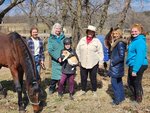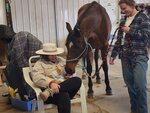BELDENVILLE – When River Falls High School senior Claire John discovered Lost Creek Ranch, she was severely depressed and anxious all the time. She didn’t know what to do. Her parents …
This item is available in full to subscribers.
To continue reading, you will need to either log in, using the login form, below, or purchase a new subscription.
If you are a current print subscriber, you can set up a free website account and connect your subscription to it by clicking here.
Otherwise, click here to view your options for subscribing.
Please log in to continue |


BELDENVILLE – When River Falls High School senior Claire John discovered Lost Creek Ranch, she was severely depressed and anxious all the time. She didn’t know what to do. Her parents didn’t know what to do. Nothing was working.
“I was regularly on the brink of ending my life,” John said. “I had recently stopped riding at another barn because it wasn’t working out. We had done everything. I was in a six-week intensive program after school until 9 p.m. every day. It’s not like we weren’t trying.”
Somehow they found Lost Creek Ranch in Beldenville and toured the facilities in May or June about six years ago. She knew immediately she had found someplace special. The surroundings and horses soothed her soul. She started taking riding lessons once a week and soon spent every possible waking moment at the ranch.
“I would say the barn has been a big part in me still being alive,” she reflected.
Founded in 2000 by Lynette Weldon, Lost Creek Ranch is a nonprofit rescue organization dedicated to creating a supportive environment for participants to discover the therapeutic and healing nature of riding.
“Our equine therapy programs and lessons improve lives, creating happiness while building resiliency, empathy, responsible risk-taking and self-control among participants who build life-long connections with our staff, horses, and a diverse and intergenerational group of participants and supporters. Lost Creek Ranch is the only horse rescue program offering therapeutic equine-assisted therapy programs in the western Wisconsin area,” the website states. “Our rescue, adoption and rehabilitation programs match horses to humans, healing countless lives. We are proud to bring the love and healing nature of horses to everyone through scholarship and other programs, regardless of a participant’s ability to pay.”
In the early 2000s, Weldon, a recognized master clinician and trainer, trained and boarded horses. She came across many who were abused or neglected, which broke her heart.
“I would have boarders who would just abandon their horse,” she said. “So what I had to was, if I rescued a horse, they had to be able to do something to sustain the ranch. I trained them to be able to do lessons from beginner to advanced.”
The sheriff’s department contacted her to rescue horses they found starving to death, or owners who were too old or sick to take care of them.
“My specialty was always behavior training with horses that were not always really safe,” Weldon said. “I’m really good at gaining trust and turning them into really nice riding horses that are safe.”
She started seeing many young people who seemed to be struggling with mental health or in school. She also saw that horses helped improve their self-esteem and self-worth. She has worked with people with musculoskeletal and neurological conditions — ranging from autism, ADHD, cerebral palsy, down syndrome, multiple sclerosis, traumatic brain/head injuries to arthritis, cancer, behavioral disorders and mental health conditions — and has been recognized by the Wisconsin Department of Health Services, as well as Lost Creek Ranch program participants.
Weldon has rescued and rehabbed more than 100 therapy horses, 15 of which are in active service today.
Lead instructor/clinician and Chief Operating Officer Ruth Harper has been recognized for her ability to create personalized plans to address the musculoskeletal, neurological and mental health needs of program participants.
“When we moved out here (from Ellsworth), Ron Kiesler from Pierce County asked if we wanted to do the Comprehensive Community Services program,” Weldon said. “It fit right into the mission of the ranch.”
“That’s what we were already doing with no pay,” Harper added.
“We never relied on funding or grants,” Weldon said. “We had always been able to sustain through camps, regular paid lessons, scholarships and working off lessons.”
Harper admitted that made it sometimes tough to pay the bills, when five students might be working for lessons and two were paying. They never wanted to turn anyone away, so the CCS program seemed like a Godsend.
According to Paul Brenner, senior fiscal manager representing the Western Region Recovery and Wellness Consortium, CCS is a Medicaid-funded fee-for-service program for eligible Medicaid recipients. The WRRWC has been certified by Medicaid to pass funding through to community providers who are in compliance with Medicaid guidelines. Brenner said there are also administrative requirements related to providing an annual audit, provider credentialing, claim submission, documentation, etc.
However, as happened for many during the pandemic, COVID made completing required paperwork almost impossible. Lost Creek Ranch fell behind in getting their audits done.
“It was impossible to find anyone taking on new audit clients,” Harper said. “We finally found a place to do it and we had letters of engagement, but they said no, we gave you enough time.”
Weldon and Harper learned their CCS contract would be terminated Jan. 1, 2024. They were shocked and devastated.
The company that had been doing their audits “dropped the ball” and would occasionally respond to emails, Harper said.
“It literally took us almost two years to find someone who would do a nonprofit audit. They just did not care,” Weldon said.
Harper asked if they could get their audits completed and reapply for the program, but they were turned down.
Brenner said Lost Creek Ranch was not in compliance with the audit requirement and failed to provide audits for several years.
“The essence of the audit is to make sure only allowable costs are reimbursed and to identify profit over the allowable maximum amount (generally 7.5% percent, but there can be adjustments),” Brenner said. “In the audit, the auditor provides the assurance that Department of Health Services is looking for that costs met the principles of allowability required by the program.”
Weldon said she has left voicemails with the consortium but has gotten no reply.
“I understand that not having an audit puts us at risk, but then let us get things in order and reapply,” Harper said. “We have had huge success stories from kids who have come through the program. They learn to be responsible, good communicators.”
Lost Creek had to rehome a few horses to cut costs. They held an online auction, sold two horses and offered sponsorships for bales of hay and feed.
“We’re trying to work things that way. The horses that need to be rehomed are unfortunately the ones that no one wants, that are unrideable,” Harper said.
But there is hope, and these women and their supporters don’t give up easily. They are finalists for a $10,000 Power of 100 Women – Ellsworth grant, which will be selected in April. They are also working with a grant writer on their board. And of course they’re doing what they do best: Offering lessons, summer day camps and an after school saddle club. They also have a show team.
“Our plan going forward is to get a combination of grants and private pay clients and become self-sustainable,” Harper said. “We were given a six-week notice when we lost funding. We had so many clients coming through CCS that we kind of restructured to accommodate them. The kids cried and cried and cried. Many parents called the county to complain.”
Lost Creek still has a contract with St. Croix County, though there aren’t as many participants. They are looking forward to working with interns from the UW-River Falls Animal Science program and encourage people to check out their programs.
“We have a unique environment, having kids from age 5 to retired interacting and working,” Harper said. “We have several different nationalities; we don’t discriminate and we are very welcoming to all.”
“We have a really family-oriented community,” Weldon chimed in.
Board member Cathy Moeger said she loves the welcoming environment and their ability to meet people where they are at the moment.
“I cam in unbalanced, slightly fluffy, and started again with lessons after 25 years.,” Moeger said. “Even if it’s just grooming a horse to make yourself feel better.”
Pat Kolman, who will soon turn 80, discovered Lost Creek through John.
“I had my horses and I just lost both of them in the last few months and this is my way of healing, so it’s been sad, but this is a wonderful thing for me to do,” she smiled.
To learn more or donate, visit lostcreekranchwi.org Lost Creek Ranch is located at N6943 570th St., Beldenville.